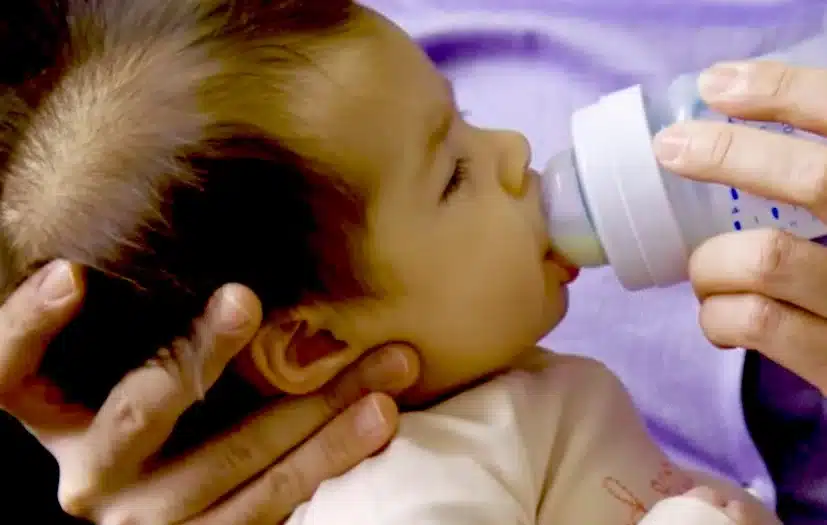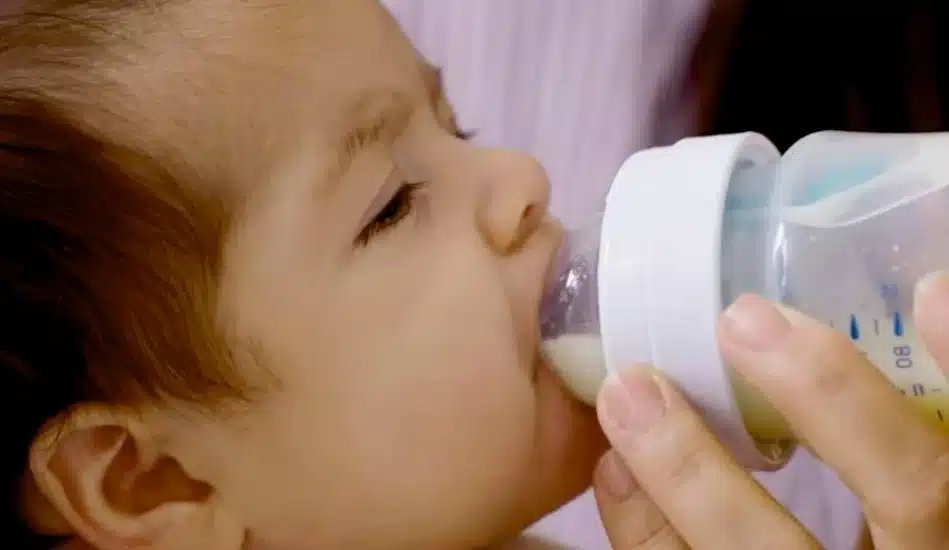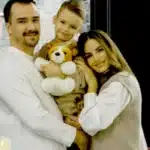5 Simple Reasons Why Baby Squirms and Cries While Bottle Feeding

As a parent, the most important thing is ensuring your child is safe, healthy, and comfortable. So, if your baby is crying and fussing while being fed from a bottle, it can be stressful and annoying, especially if you don’t know why. Why Baby Squirms and Cries While Bottle Feeding? Welcome to our special coverage for You and your little one.
If your Baby Wriggles and Cries while being fed from a bottle, it may have colic or an allergy to cow’s milk. This behaviour can also be caused by an upset stomach from too much gas, acid reflux, or a broken baby bottle.
Your baby can’t tell you what’s making them act that way, which makes it even harder to figure out. So, what you can do is watch for signs. It’s essential to figure out why your baby is acting out so that you can treat or stop it from happening again.
1. Feeling Hungry
You might hear your baby moving because they’re hungry and want to eat more. Babies may need to eat more often than you think because their bodies aren’t massive yet.
2. Your Child has Acid Reflux
Your baby may cry & wiggle while trying to get the bottle. They’re still hungry, though. That means your child might have baby reflux when stomach acid moves back into the food pipe. Most of the time, a weak oesophagus is to blame.
Babies often have reflux, and it goes away on its own over time. Your baby will cry & not settle down; they will cough or hiccup while eating. They may also get sick while being fed a bottle or right after.
Baby Squirms and Cries While Bottle Feeding
3. The Baby Bottle is Broken
Your baby will probably move around & cry while fed from a bottle if they don’t get enough milk. This is because milk doesn’t come out of the bottle’s mouth. The same thing will happen if a broken bottle nipple releases too much lactate.
4. Your Child is Allergic to Something
Allergies could be making your baby move around & cry while you feed them from a bottle. Some babies are allergic to cow’s milk. For babies with a milk allergy, their immune system responds too strongly to proteins found in cow’s milk formula.
Cow milk allergies can appear in babies fed formula in a bottle. Ultimately, most baby foods are made with protein from cow milk. Babies fed breast milk from mothers who drink cow’s milk can also get sick.
Proteins are seen as dangerous invaders by the immune system, which is in charge of fighting infections. Because of this system reaction, the body lets out chemicals like histamine. Histamine can cause allergy symptoms in many body parts, such as the skin, eyes, lungs, throat & more.
If your baby is squirming & crying while being fed from a bottle & has other signs, you’ll know they have a milk allergy. The symptoms of a milk allergy differ for each child, but here are the most usual ones you should be aware of.
Baby Squirms and Cries While Bottle Feeding
5. Because of Gas
If your baby has too much gas, burp it twice to eliminate it. Remember to burp your baby before every feeding, even if it’s asleep. Sitting up, lying on your lap, or your shoulder are the best places for a baby to burp.
As was already said, feeding your baby from a bottle doesn’t cause extra gas. Another critical factor is crying too much. So, it’s helpful to know your child’s signs and feed them before they call or act out because they’re hungry.
Why Is My Baby Squirming While Bottle Feeding
It’s normal for your baby to cry, squirm, or kick when they don’t want to drink from the bottle. To understand your baby’s cues, it may take a little while.
Your baby moves around, cries, or turns her face away while you feed her from a bottle. She may have gas in her tiny stomach. If she looks tense or hangs out of the liquid but doesn’t seem complete, try burping to get the bubbles to rise. You can also take a belch break before the middle of the eating.
You might not understand why your baby cries while fed from a bottle. If you feed your baby formula, they might call while you provide them with a bottle. Your baby might not cry all the time because of allergies, though.
Simple Signs of Problems with Bottle-Feeding
| Baby didn’t close the lips surrounding the nipple. |
| The nipple should not be held in the mouth but should hang out. |
| Moving away from the liquid. |
| It means taking at most a little bit at first. |
| It was taking too long to eat. |
| It’s crying when it’s time to nurse or when the bottle is tapped. |
| I am getting sleepy during the feed. |
| A child’s mouth is full of milk. |
Common Reasons Babies Squirm and Cry When Bottle Feeding
A. Distractions
As soon as babies can see & understand what’s happening around them, they move or squirm while fed from a bottle. It could happen in as little as 3 or 4 months. Babies will wiggle from a cup as they notice the sounds, sights & things around them.
They will stop & respond to the noise if they are fed from a bottle & hear their brothers playing in the background. As your baby gets more extensive & mobile, they will move around even more when provided with a bottle.
Solution Approach
If your baby moves around a lot while being fed from a bottle, you should provide them good comfort, especially your caring presence. Put them somewhere quiet, dim the lights, give them their best toy, and give them a bottle.
B. Itchy skin
If your baby cries while being fed from a bottle, you might first think they have an allergy. A lot of parents are apprehensive about this. You may also notice other signs, like your baby throwing up, having diarrhoea, a rash, or blood or mucus in their stool, if they are allergic to cow’s milk or another substance in their baby formula.
Solution Approach
Luckily, there are now a lot of formulas on the market that are made just for kids who are allergic to or sensitive to lactose. You can select the one that fits your needs.
Baby Pushing Bottle Away but Still Hungry
Being fed is one of the most essential parts of a Baby’s routine, and it can be very frustrating if they keep pushing the bottle away when they’re still hungry. The bottle might be getting pushed away for several reasons. Below are the common ones:
A. The child might be Teething
Your baby may be pushing the bottle away from you because they are teething.
They struggle with teething, so they refuse food & formula drinks.
B. Your Baby may not be feeling well
If your child is having trouble eating and pushing the bottle away, it may be because he or she is sick.
Do not wait to call your doctor if you are worried about your baby’s eating habits or think they might be sick.
C. S/He doesn’t Want Mom to Give Her/Him the Bottle.
The fact that MOM gives the bottle to the child could be one reason the child is pushing it away.
They won’t take the bottle, even if they’re hungry, because they want to be fed by their MOM. Most babies would rather have breast milk than the formula their parents give them because their parents are too busy to provide it.
Baby Squirms and Cries While Bottle Feeding
D. Atmosphere Changes
As we’ve already said, babies can forget about all the noise around them when given a bottle.
Because of this, it is best to take them somewhere dull & quiet so that outside forces don’t confuse them. That is, they will only be focused on the milk bottle you give them.
E. It’s too hot or too cold
How hot or cold the milk is when you give it to them is also very important.
Babies will finally turn down the bottle of milk or formula if they don’t like the temperature. Babies like it when the milk is about the same temperature as breast milk, which is quite warm. Check to see if the milk is cold.
3 Major Reasons Baby Keeps Unlatching but Still Hungry

A lot of us can get lost when things keep unlatching. Your baby may always look hungry when she unlatches from the breast. She pulls on your nipples or cries over & over again, clearly upset.
A. No noise reflux
Talk to your child’s paediatrician, especially if her behaviour doesn’t seem to be getting better. Silent reflux can often change how babies feed, even if they don’t unlatch.
If you have a problem like silent reflux, tongue tie, or an allergy, your paediatrician can help. Contacting them can make you feel better about what you’re doing and give you peace of mind.
B. Milk flow is slow
If your baby isn’t unlatching because of a fast milk flow, it might be because of a slow milk flow. To get more milk, she might be pulling on your nipples, especially if she’s starving or if your milk supply is low.
C. Stuffy Nose
Imagine having a glass of water while your nose is stuffy. That’s how hard it can be to breastfeed when your nose is stuffy. Your sick baby may want to unlatch to get some air if she can’t breathe well because of a stuffy nose.
Why Does My Baby Keep Unlatching
Baby Squirms and Cries While Bottle-feeding
| Teething | Using teething toys to calm down |
| Latching Issues | The Right Way to Do It |
| Engorged Breasts | Breasts that are Swollen, Pumping & Expressing milk |
Don’t freak out or worry if your baby is crying & not hanging on. As your baby grows, it’s normal for them to have trouble with these daily routines from time to time. Take a deep breath & think about what could be causing the problem.
How To Fix Clicking While Bottle Feeding
If you are bottle-feeding & hearing clicking sounds, you can try a few good things to fix the problem.
A. Check the flow of the nipple
Clicking sounds may happen if your baby’s milk or formula flows too quickly or slowly. Try a few different nipple sizes & flow rates until you find the best one for your child. If the nipple is too fast, the person may gulp; if it’s too slow, they may get frustrated & stuck too much, making clicking sounds 1. Make Sure the Latch Works.
When babies make clicking sounds, it’s often because the latch between their mouth & the bottle nipple isn’t working right. Check that your baby’s mouth is open & covers much of the nipple. This will help make a better seal & keep air out of the bottle, which can cause popping sounds.
B. Change where the bottle is placed
Clicking sounds can also be caused by where the bottle is placed. To get rid of the air inside the bottle, tilt it a little so that the milk or formula fills the mouth. If you put the bottle too high, it could take in too much air, which would make clicking sounds.
Baby Squirms and Cries While Bottle Feeding
C. Cradle, Your Child
Baby Squirms and Cries While Bottle Feeding: It’s also possible for your baby’s tummy to make clicking sounds while you feed them from a bottle. During eating, take a moment to burp your baby & remove any extra air. This might help stop the clicking sounds & make your baby feel better.
D. Get help from a Professional
If the clicking sounds don’t go away after trying these things, you should talk to a paediatrician or lactation expert. They can look at the latch & give you specific instructions on how to fix the problem.
Using these valuable tips, you can eliminate the clicking sounds that happen when you feed your baby from a bottle & make the experience more pleasant for both of you.
How To Stop Baby Clicking When Bottle Feeding
As a parent, you may have heard your baby clicking while they were drinking from a bottle. Seeing your child act this way can be scary, and you may want to know why you need to help them.
| Getting the best feeding positions |
| Select the Right Bottle & Nipple Size |
| Making Sure the Latching Works |
| Treat Tongue-Tie |
Positioned in such a way that milk flows more slowly to help the baby control the flow. To help the baby make a better seal around the nipple, try feeding them in different ways. To keep the baby from getting gassy, burp them often while they’re eating.
Why Is My Baby Squirming While Breastfeeding

Babies who are being fed through breastfeeding often move around while they are being provided. Babies usually move around to show they’re happy & getting all the milk they need. But some factors could be why your baby moves around too much or looks uncomfortable.
These are the primary reason:
| Developmental Leap or Growth Spurt |
| Quick letdown |
| Being Tired |
| Too much stimulation |
| Hungry |
| Lack of focus |
Conclusion
Thank YOU for your precious time. We hope you enjoyed our detailed “Baby Squirms and Cries While Bottle Feeding” analysis. If our post is helpful, like and share it with your loved ones. Wishing you a happy and healthy life!!
Also, Read
Do Babies Know When Someone Is Pregnant









1 thought on “Why Baby Squirms and Cries While Bottle Feeding”